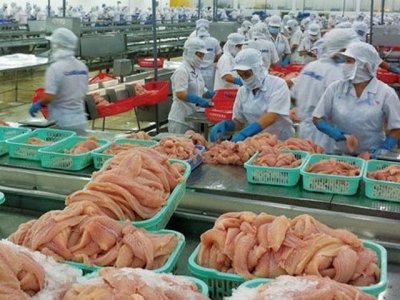Vietnamese tra fish exporters oppose unfair US duties on fish fillets

Tra fish processing for export (photo: thuysanvietnam)
The Vietnam Association of Seafood Exporters and Producers (VASEP) and enterprises oppose the unfair decision made by the US Department of Commerce (DOC) and are considering beginning the necessary legal procedures to file a complaint with the US Court of International Trade (CIT) to ensure the interests of Vietnamese enterprises, said VASEP general secretary Truong Dinh Hoe.
"We ask the DOC to carefully review all the records and data that Vietnamese enterprises have provided as a basis for calculating and providing accurate and reasonable tax rates for the companies involved in the DOC's 13th administrative review (POR 13)," Hoe added.
The opposition was raised as the DOC has recently published the final results of the POR 13 of antidumping duties on frozen tra fish fillets imported from Vietnam between August 1, 2015 and July 31, 2016, that imposes antidumping duties of US$2.39- 7.74 per kg of frozen tra fish fillets.
According to VASEP, the duty rates are unreasonably high and will make it much more difficult for Vietnamese tra fish exporters to enter the US market.
VASEP claimed that the duty rate of US$7.74 is 5.61 times higher than the rate levied in the POR 12 and is the highest ever duty rate.
The VASEP general secretary said that the final results of POR13 have shown unfairness and impose unwarranted penalties on Vietnamese enterprises which are contrary to usual regulations on antidumping duty.
This is an unprecedented matter, reflecting the subjective and unreasonable imposition of the DOC during the review process, Hoe noted.
Related news
 Fish exporters left lost at sea
Fish exporters left lost at sea Unfair and unreasonable – that’s how seafood exporters have branded a price hike in anti-dumping duty imposed by the United States on frozen fish fillets.
 Methodical approach to exporting aquatic products to US suggested
Methodical approach to exporting aquatic products to US suggested Vietnamese firms should take a methodical approach to exporting aquatic products to the US.
 An Giang expands material tra fish farming area
An Giang expands material tra fish farming area The Mekong Delta province of An Giang has expanded breading areas for material tra fish (pangasius) due to increasing export demand since the start of the year